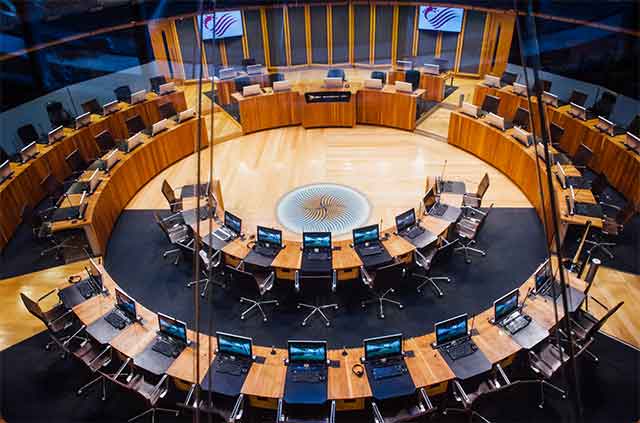Opposition Senedd members accused the Welsh Government of taking a “scattergun” approach to growing the Welsh economy.
Samuel Kurtz said the UK Government inherited the fastest-growing economy in the G7, inflation at 2% and an economy that saw 800 jobs created every day since 2010.
But he contrasted this with what an incoming Welsh Government would inherit, saying Wales has the lowest employment rate and highest economic inactivity in the UK.
The Conservatives’ shadow economy secretary warned Welsh workers take home less pay than their counterparts in England, Scotland or Northern Ireland.
Mr Kurtz, who represents Carmarthen West and South Pembrokeshire, raised concerns about a lack of job creation targets in Wales, “with little more than a scattergun approach”.
‘Dirty words’
He asked: “This managed decline, how much longer are we prepared for it to go on for?
“Economic growth and wealth aren’t dirty words – they are needed to fund our schools, our hospitals and other public services that we hold dear.”
Luke Fletcher, Plaid Cymru’s shadow economy secretary, agreed with the Conservatives – at least on the “scattergun” approach, a claim that was rejected by the Welsh Government.
He welcomed the UK Government’s workers’ rights bill, which is expected to be published next week, as well as plans to bring forward an industrial strategy
But, responding to the Welsh Government statement on October 8, Mr Fletcher raised concerns about “no apparent targets” being set on improving growth in Wales.
His Plaid Cymru colleague Mabon ap Gwynfor urged Welsh ministers to “get to grips” with the NHS, adding that growth is inexorably determined by the health of the population.
‘Open for business’
Wales’ new economy secretary Rebecca Evans said the economy has faced major challenges from Brexit to the pandemic which were compounded by years of austerity.
She said: “This has impacted growth and had far-reaching consequences for household incomes. But, despite these challenges, the overall economic environment continues to improve and we are seeing signs of growth which we must facilitate and maximise.”
Ms Evans, who was appointed in September, described the tone of the Labour UK Government as a “world away” from the previous Tory administration.
Stressing that Wales’ first minister has made green growth a priority, Ms Evans pointed to significant opportunities for investment in clean energy to address climate change.
In the statement to the Senedd on economic growth, she said: “This can only be achieved in partnership with business, academia, regions, unions, local authorities, private sector investors and the UK Government. And, together, Wales is open for business.”
Planning fee hike
Ms Evans revealed plans to raise fees for planning applications and increase the pipeline of planning officers in Wales, with a consultation set to get under way in the autumn.
She said: “Austerity has impacted the planning sector, lengthening the time taken to make decisions, increasing uncertainty and business costs.
“I am determined to address this by ensuring that resources are in place.”
Ms Evans, who is responsible for energy and planning, vowed to ensure a pro-business, pro-worker environment that supports innovation, research and high-quality jobs.
The economy secretary said floating offshore wind could transform coastal communities as she pledged to work with Great British Energy to realise the opportunity.
She added that the circular economy will be crucial, pointing out that Wales is second in the world for recycling and highlighting a £1bn development at Shotton Mill, Deeside.
‘Growth for whom?’
Hannah Blythyn, who represents Delyn, called for inclusive economic growth.
She said: “I think growth needs to be equitable in the way that it’s both generated and governed and as part of an approach that empowers people rather than exploits them.”
The former minister argued public money should not go to businesses that do not align their principles with the Welsh Government’s commitment to fair work.
Mike Hedges, a fellow Labour backbencher, said the Welsh economy has performed poorly against the UK average for the whole of the post-war period.
Mr Hedges, who represents Swansea East, attributed this to a relative lack of high-paying sectors such as life sciences, IT and professional services in Wales.
“Until the structure of the Welsh economy is addressed, then growth will continue to lag behind the UK average,” he warned.

